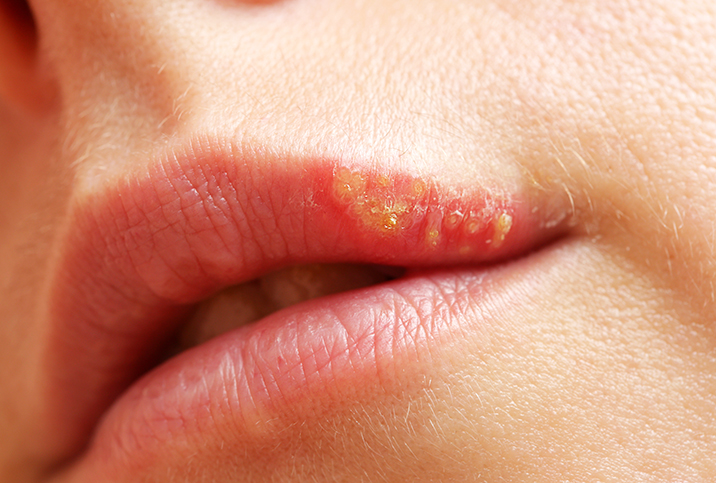6 Facts About Living With Herpes

About 4 billion people worldwide have the herpes simplex virus in either its oral form (HSV-1) or genital form (HSV-2), with the oral form being by far the most common type. In the United States alone, more than 1 in 6 people between the ages of 14 and 49 live with genital herpes.
Both strains present with a sore or a blister that tingles or itches and can rupture and ooze fluid. Generally, symptoms first emerge within 20 days of exposure and typically last seven to 10 days.
The physical signs that you've contracted the herpes simplex virus include tingling, itching or burning where the sore appears. Your symptoms may resemble the flu, and you may experience urinary problems and eye infections.
We've compiled six basic facts everyone should know about herpes. A few might surprise you.
1. Interchangeability
The two main types of herpes are sometimes interchangeable. “Herpes” usually refers to one of two strains. There's oral herpes, commonly spread through the HSV-1 virus and usually affecting the mouth area. The other is genital herpes, which is typically contracted through exposure to the HSV-2 virus and affects the genital and anal region.
Both strains are lifelong infections whose symptoms appear during outbreaks. Typically, an infected person shows no symptoms, and the virus remains in a dormant state.
Commonly, a person gets infected through contact with an infected person who is (usually) in the midst of having a flare-up: oral-to-oral contact in the case of HSV-1, or unprotected genital or anal sex for HSV-2. But even though we call HSV-1 oral herpes, it can be passed on to a partner via oral sex if the carrier is experiencing an outbreak. That is, cases of genital herpes have been traced to infection of the genitals by a person who has the oral strain.
It's also possible to contract the virus from a carrier's oral or skin surfaces even if they aren't currently experiencing a flare-up.
2. Variety
There are more than two herpes viruses. At least nine known herpes viruses can infect humans. All told, Herpesviridae is a family of more than 100 DNA viruses that infect humans and animals.
Apart from HSV-1 and HSV-2, some of the better-known strains include the varicella-zoster virus, which is the cause of chickenpox and shingles, and the Epstein-Barr virus, which is the cause of mononucleosis and certain cancers. Another strain is Kaposi's sarcoma-associated herpesvirus, or HHV-8, which often affects people with AIDS.
3. An HIV connection
Having herpes puts you at higher risk of contracting HIV, or human immunodeficiency virus. Being a carrier of genital herpes (HSV-2) makes a person up to three times more likely to contract HIV. Researchers long hypothesized that this was because herpes sores were present on the genitals, but even with drug treatment to suppress outbreaks, the elevated risk of HIV remained for people with HSV-1, as well.
Even after the skin had healed, elevated numbers of the type of cell-surface receptors HIV needs to enter a person's T-cells were present. HIV replicates three to five times more rapidly in lab cultures in cells cultured from healed HSV-2 sores.
4. Predictable outbreaks
You can often predict a herpes outbreak. The herpes simplex virus mostly resides in the nerve root. So when it becomes active, it affects the nerves and causes a lesion to occur in certain spots. Patients will often reference a tingling or burning sensation well before a lesion is visible.
5. Limited protection
Condoms only protect so much. A meta-study that looked at condom use and the acquisition of HSV-2 found that using a condom reduced the chances of catching the virus by 30 percent. If you feel an outbreak coming on, it's best that you refrain from having sex, even with a condom.
Also important to note: If you're allergic to latex condoms, lambskin condoms don't provide as much protection from STDs like herpes.
6. Incurable but treatable
There is no cure for herpes, but there's treatment. A herpes diagnosis means living with the virus, but you can keep outbreaks to a minimum with several medications, including acyclovir, famciclovir and valacyclovir.
In addition to drugs that can reduce the frequency of outbreaks, antiviral ointments can relieve symptoms such as the itching, burning and discomfort of a flare-up.
Having herpes doesn't mean you can't have a full and rich sex life, as long as you remain vigilant, listen to your body, take your meds, keep your partners informed and take all necessary precautions.


















